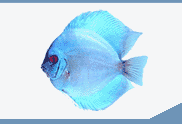

 |
||||||||||||
 |
||||||||||||
| Cryptobia iubilans in Cichlids | ||||||
| Page 3 of 3 | Pages: 1 . 2 . 3 | |||||
Treatment: Spironucleus usually responds well to metronidazole administered in feed or as a bath. The recommended dose in feed is 1% (4.5 grams active drug per pound of feed) fed daily for five consecutive days (see IFAS Extension Fact Sheet No. VM-67). The bath treatment is 6 mg/L (250 mg added to 10 gallons of water), followed by a water change four to eight hours after treatment, repeated daily for five days (see IFAS Extension Fact Sheet No. VM-67). These regimes have been very effective for control of Spironucleus in cichlids for the past ten years. Currently, there is no effective treatment for Cryptobia. Part of the difficulty may be that the parasite seems to have an intracellular stage. Parasites are occasionally seen in phagocytic cells, called macrophages, which are part of the immune system and are supposed to destroy foreign protein by engulfing it. Cryptobia seems to be able to live within these cells rather than being destroyed by them. This can make it difficult to treat Cryptobia because most drugs are not able to penetrate the cell wall of a macrophage. Some Florida farms have used a sulfa drug (sulfadimethoxine) that seems to help control mortalities in some cases, but has not eliminated the parasite. Experiments are in progress at the Tropical Aquaculture Laboratory (Ruskin, FL) to find an effective therapeutic agent. Summary Cryptobia iubilans is not a new parasite of cichlids but has received significant attention in the past few years. It seems to be widespread in East African cichlids and has been found in Pseudotropheus zebra immediately following importation from Lake Malawi, suggesting that it occurs naturally in wild fish. It has also been found in some South American cichlids, most notably, discus. The parasite usually causes a granulomatous gastritis and may be associated with chronic low-level mortality. A systemic form of the disease has been reported in captive East African and Central American cichlids. This form was associated with acute mortalities and loss of 50% of affected animals. Currently there is no effective treatment for Cryptobia. Water quality, stocking density and diet may all effect the severity of infection. Work is in progress at the University of Florida to learn more about this common, but important, cichlid parasite. -------------------------------------------------------- Footnotes 1. This document is VM104, one of a series of the Veterinary Medicine-Pathobiology Department, Florida Cooperative Extension Service, Institute of Food and Agricultural Sciences, University of Florida. Original publication date January 1, 1999. Revised April 12, 2002. Visit the EDIS Web Site at http://edis.ifas.ufl.edu. 2. Ruth Francis Floyd, DVM, MS, Extension Veterinarian for Fisheries and Aquatic Sciences and Professor, Department of Large Animal Clinical Sciences and Roy Yanong, VMD, Assistant Professor for Department of Fisheries and Aquatic Sciences, Tropical Aquaculture Laboratory, 1408 24th St. S E, Ruskin, FL 33570. -------------------------------------------------------- The Institute of Food and Agricultural Sciences is an equal opportunity/affirmative action employer authorized to provide research, educational information and other services only to individuals and institutions that function without regard to race color, sex, age, handicap, or national origin. For information on obtaining other extension publications, contact your county Cooperative Extension Service office. Florida Cooperative Extension Service / Institute of Food and Agricultural Sciences / University of Florida / Christine Taylor Waddill, Dean -------------------------------------------------------- Copyright Information This document is copyrighted by the University of Florida, Institute of Food and Agricultural Sciences (UF/IFAS) for the people of the State of Florida. UF/IFAS retains all rights under all conventions, but permits free reproduction by all agents and offices of the Cooperative Extension Service and the people of the State of Florida. Permission is granted to others to use these materials in part or in full for educational purposes, provided that full credit is given to the UF/IFAS, citing the publication, its source, and date of publication. 
SimplyDiscus.com gratefully thanks the Florida Cooperative Extension Service for permission to use this article. Please visit them at http://edis.ifas.ufl.edu/ |
 |
|||||
| About Us :: Message Board :: Chat | |||||
| Library :: Photo Gallery :: Links & Resources :: Breeders & Sponsors :: Merchandise | |||||
| Website designed by: EthanCote.com | © 2001-2004, SimplyDiscus.com. All Rights Reserved. | ||||